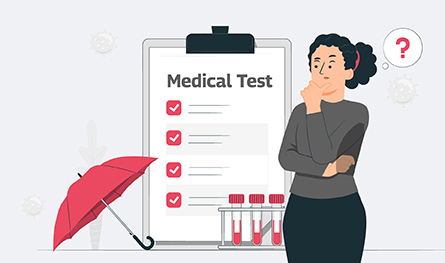What Medical Tests are Required for Term Insurance?

Many term insurance providers ask policyholders to go through medical tests before buying term plans. These tests are done to assess the health of the policyholder so that the insurance company can determine the risk profile. The premium of the term plan as well as the sum assured and policy period are also decided as per this information. Read on to learn about the tests required.

Let’s take for example a term insurance plan. We buy term insurance to secure the future of our loved ones so that in our absence (after death), our family has a backup to meet all their needs and goals financially. In helping us secure our family’s interests, the insurer too takes a risk with us, the policyholder. The insurer does not know or cannot tell for certain our exact life expectancy or how long would we actually live. This means that if, after a small period of time of buying the term insurance, we succumb to death, the insurer goes in for a loss.
This risk of financial loss always looms over the term insurance sector, undeniably. Therefore, to help provide some form of assurance to the term insurance companies, the IRDAI (Insurance Regulatory Development Authority of India) mandates all policy applicants to term insurance to undergo compulsory medical tests to confirm their state of health at the time of buying a term life insurance policy.
Why Undergo Medical Test for Term Insurance?
The entire purpose of a term insurance plan is to protect our family’s financial future. In the unfortunate event of our untimely death, our loved ones should not feel lost. With a term life insurance policy, they would have something to reliably fall back on to achieve all their financial goals. The insurance company would be liable at the time to provide a specific amount of assured monetary death benefit to the family (nominee/beneficiary chosen by the policyholder at the time of policy purchase).
Now, in case the policyholder has some pre-existing medical condition which the insurer is unaware of at the time of term insurance policy purchase, there’s a large amount of risk involved for the insurer. This would essentially imply that the insured might succumb to their disease/illness anytime soon (resulting in even death). In this case, the insurer would have to pay a huge amount of the sum insured under the policy to the family of the insured (deceased) rather sooner than expected.
This is why the insurer asks the applicant (prospective policyholder of term insurance) to undergo a specific set of medical tests before actually buying the plan. This helps the insurer to know the current health condition and state of well-being of the applicant before issuing term insurance to them. Also, the medical test for term insurance help the insurer identify or see through any pre-existing ailments that the applicant may be a patient of and accordingly decide whether or not to issue them the term life insurance policy.
Medical Test for Term Insurance List
We learned about the need for medical test for term insurance. Here we present an entire list of tests that you may need to undergo so that you know which medical test is required for term insurance, in case you decide to buy one:
- Blood Tests: Your insurance company may ask you to undergo a full body blood testing to check for any pre-existing ailment or to identify if you currently have any health condition. Blood tests analyze the cells, proteins, molecules, and the likes present in the bloodstream.
- Liver Function Test: They are also called liver panels and are directed at the assessment of a number of chemicals, including enzymes and peptides, that the liver produces. This helps identify whether or not the liver is in healthy working condition.
- HIV/AIDS Test: This is one of the most critical tests conducted for term insurance. It is common knowledge that a person diagnosed with HIV/AIDS does not have a long life expectancy. Hence, it is imperative for the insurance company to get this test done from the policy applicant before issuing term insurance to them.
- Urine Tests: Urine test also forms a part of routine testing for term insurance to identify certain ailments such as urogenital infections, diabetes, or renal disease. Urine testing is also called urinalysis.
- Abdomen Test: Ultrasound imaging is done to examine the interior of the abdomen to check for any abnormality in this organ, such as stones in the kidney, tumor, or liver disease.
- Chest X-Ray: The condition of the lungs and the working of the heart can be determined via X-rays of the chest.
- Kidney Function Test (KFT): This is yet another diagnostic test conducted for assessing the smooth functioning of the kidneys and to determine whether this vital pair of organs is performing its job well – of clearing the toxic waste from the body.
- Complete Blood Count (CBC) Tests: The CBC test is generally done to assess the general state and well-being of the body and to identify other ailments that may be present in the body. A few examples include anemia, leukemia, and any other infection.

Author Bio
Paybima Team
Paybima is an Indian insurance aggregator on a mission to make insurance simple for people. Paybima is the Digital arm of the already established and trusted Mahindra Insurance Brokers Ltd., a reputed name in the insurance broking industry with 17 years of experience. Paybima promises you the easy-to-access online platform to buy insurance policies, and also extend their unrelented assistance with all your policy related queries and services.
Other Life Insurance Products
Latest Post

Your health insurance policy gives you a No Claim Bonus when you fulfil your policy term without needing to make a claim. Your premium payments will decrease step by step through this feature. The bonus system benefits everyone involved in the insurance process. It helps customers to practice better healthcare habits and brings savings on insurance expenses.


There is no question, in fact, that daughters bring a special kind of sparkle into our lives – along with an endless list of questions, a closet full of dresses, and some very specific birthday party themes. But beyond the laughter and everyday chaos, we need to understand that there is a real responsibility on our shoulders: making sure they grow to be healthy, strong, and ready to take on the world.


Marriage is built on shared dreams, countless compromises, and a commitment to protect each other through thick and thin. While love, trust, and communication form the emotional foundation of marriage, a little bit of financial planning doesn’t hurt either. This is exactly where spouse term insurance steps in — a simple yet powerful way to safeguard your future together.

When managing insurance policies, one term that often comes up is the “Grace Period.” It’s a window of opportunity provided after the premium due date, allowing policyholders to renew their insurance without losing accumulated benefits. However, this grace period does not work the same way across all types of insurance. Understanding how it differs between health, life, and car insurance is crucial for avoiding lapses and ensuring continuous protection.


In a world where flexibility and better service are increasingly expected, health insurance portability allows policyholders to move from one insurer to another without losing the benefits they’ve already earned. Introduced by the Insurance Regulatory and Development Authority of India (IRDAI), this provision empowers individuals to seek better coverage, improved customer service, or lower premiums without the fear of starting from scratch.


